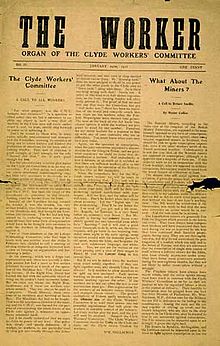Clyde Workers' Committee

January 1916 edition of The Worker
|
|
| Successor | Scottish Workers' Committee |
|---|---|
| Formation | October 1915 |
| Founded at | Glasgow |
| Extinction | 1916 |
|
Membership
|
200 - 300 |
|
Chairman
|
William Gallacher |
|
Treasurer
|
David Kirkwood |
|
Formerly called
|
Central Labour Withholding Committee |
The Clyde Workers Committee was formed to campaign against the Munitions Act. It was originally called the Labour Withholding Committee. The leader of the CWC was Willie Gallacher, who was jailed under the Defence of the Realm Act 1914 together with John Muir for an article in the CWC journal The Worker criticising the First World War.
The committee originated in a strike in February 1915 at G. & J. Weir. Due to labour shortages during the war, the company had employed some workers from America, but were paying them more than the Scottish staff. The shop stewards at the factory organised a walk-out in support of equal pay, and more factories joined the dispute over the next few weeks, until workers at 25 different factories were on strike.
Most of the workers were members of the Amalgamated Society of Engineers (ASE), but the union leadership, both locally and nationally, opposed the strike. In order to defend the strike, about two hundred shop stewards and supporters formed the informal Central (or Clyde) Labour Withholding Committee, which was constituted as the Clyde Workers' Committee in October 1915.
The committee met weekly, and included numerous people who later became prominent socialists and communists. These included Gallacher, Tom Bell, David Kirkwood, John Maclean, Arthur MacManus, Harry McShane and Jimmy Maxton. Many of the leading figures were members of the Socialist Labour Party (SLP), but others were involved with the British Socialist Party, the Independent Labour Party, or had no previous political involvement, the general approach being broadly .
...
Wikipedia
